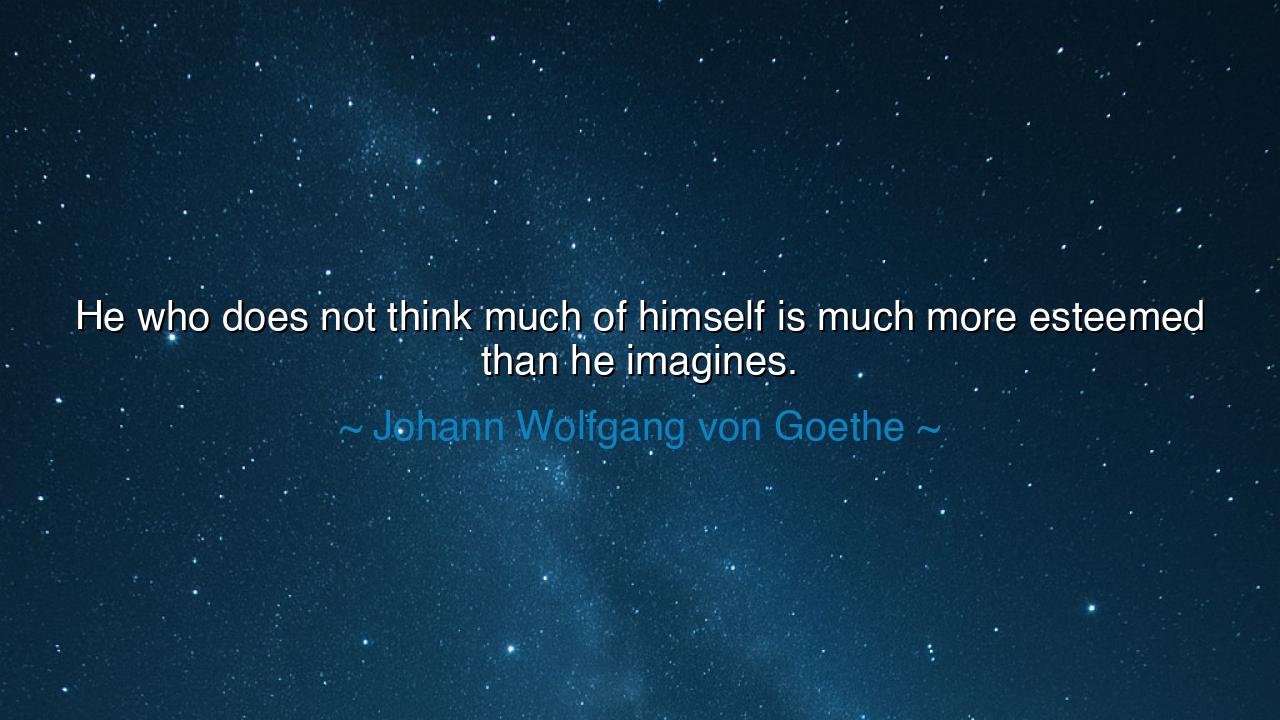
He who does not think much of himself is much more esteemed than






The sage Johann Wolfgang von Goethe, whose words were both flame and mirror, once declared: “He who does not think much of himself is much more esteemed than he imagines.” At first glance, these words may seem modest, even gentle—but within them lies a profound understanding of human nature and the hidden laws of honor. Goethe teaches that humility is not weakness, but quiet strength; that those who make little noise about their worth often command the greatest respect. For true greatness shines most brightly when it does not seek the light.
In the courts of the ancients, the proud man proclaimed his glory to the heavens, but the wise man kept his counsel. Pride hungered for the applause of others; humility needed only the peace of conscience. The one shouted, “See me!”—and was soon forgotten. The other walked silently, and all hearts turned toward him in reverence. Goethe understood that self-conceit blinds the soul, while modesty reveals it. He who does not think much of himself walks lightly upon the earth, and in that very lightness, others perceive grace, strength, and quiet dignity. The man who seeks no esteem often receives it in abundance, while the man who demands it is starved.
Consider the story of Marcus Aurelius, emperor of Rome and philosopher of restraint. He ruled the greatest empire of his time, yet his writings were filled not with pride, but with self-doubt, humility, and reflection. “Waste no more time arguing about what a good man should be,” he wrote, “Be one.” He seldom thought of his own greatness, yet his legacy endures as the ideal of the philosopher-king. His modesty, not his crown, made him beloved. He did not think much of himself, but the centuries have esteemed him far more than he ever could have imagined. Thus history, the great judge, honors the humble more deeply than the boastful.
For what, after all, is esteem but the reflection of a pure soul upon the eyes of others? Those who chase admiration lose it, for admiration is a spirit that flees from pursuit. But those who labor sincerely, without vanity, attract respect as flowers attract the morning dew—naturally, effortlessly, beautifully. Humility is not the denial of one’s worth; it is the recognition that worth does not need to be proven. The wise do not shout their virtues, for virtue speaks in silence. The humble heart is a temple; the proud heart, a marketplace.
There is a hidden paradox in Goethe’s teaching: to think less of oneself is not to despise oneself—it is to be free from the tyranny of self-consciousness. The man who is always thinking of his image, his reputation, his glory, becomes his own prisoner. But the man who serves truth, art, or duty without thought of his own reflection moves with the freedom of wind and water. Others look upon him with admiration, for he has become what all wish to be—authentic, unguarded, whole. In his simplicity, there is majesty.
Yet beware false humility, for it is pride in disguise. The truly humble do not proclaim their smallness; they simply live without pretense. True modesty is a quiet awareness that one’s gifts are not entirely one’s own—they come from the labor of countless others, from fortune, from time, from grace. The wise soul remembers this, and gratitude guards him from vanity. Such a man does not need to compare himself to others, for he measures his worth by the goodness he gives, not by the praise he receives.
And so, the lesson endures: esteem follows humility as the shadow follows the sun. Do not strive to make others see your greatness; strive to be great in silence. Let your deeds, your compassion, and your steadfastness speak for you. Think less of yourself, and life will think more of you. Each day, practice humility by listening more than you speak, by serving without boasting, by accepting correction without bitterness. Remember Goethe’s wisdom: the world honors most deeply those who do not demand its honor. The humble man walks unnoticed—but when he is gone, the earth remembers his footsteps.






AAdministratorAdministrator
Welcome, honored guests. Please leave a comment, we will respond soon